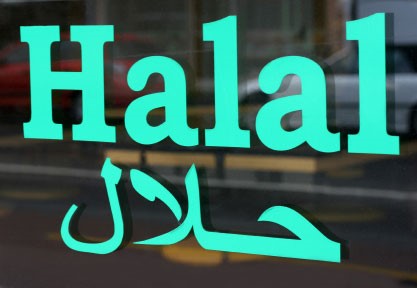What is Halal Food?
Halal (also spelled halaal) is an Arabic word that means “lawful or permitted.” It is a term that is used in the Islamic religion in contrast with the word haram (which means “unlawful or not allowed”). These terms indicate which life practices are allowed or not allowed for those who practice Islam (Muslims). While halal refers to much more than just Islamic dietary practices, the term is most often thought of when talking about food, drinks, and other products.
Halal Meat and Poultry
Halal meat and poultry are products from acceptable sources where the animal slaughtered was dispatched by a sharp knife slicing the jugular vein and carotid artery while invoking the name of God (Allah). The killing of animals for food is considered a sacred act and must be completed with halal processes.
Carnivorous animals with fangs, such as cats, wolves, lions, dogs, etc., cannot be considered halal, and pork is also forbidden. A chicken, for example, is an herbivore, but any bird with large talons indicates that it is a carnivore (such as an eagle) and would not be an acceptable source.
There are several other details involved in the slaughter. A few of these include:
1. The cut must be carried out in a single motion.
2. Severing the spinal cord is forbidden.
3. Animals must be well treated prior to slaughter.
Other Halal Food Products
In general, a product is considered halal if it is free of any substance or ingredient that was taken from a haram source. It must also be manufactured or stored by utensils, equipment, and machinery that have been cleansed according to Islamic law. Finally, it must never have been in contact with, touched, or near to a haram substance during its product life cycle (from production to storage).
These food products can be considered halal when meeting the above criteria:
i) Fish and seafood
ii) Grains
iii) Bread products
iv) Pastry items (frostings and coatings)
v) Desserts (cakes and pastries)
vi) Cereals (breakfast, natural, and organic)
vii) Pasta
viii) Dairy products (whipped toppings and drink mixes)
ix) Milk (from species considered halal)
x) Cheese, cheese products, and coatings
xi) Ice cream and ice cream toppings
xii) Eggs (powdered, frozen, and processed)
xiii) Coffee mixes
xiv) Tea blends
xv) Seasonings
xvi) Fruits (fresh and or dried)
xvii) Honey
xviii) Syrups (table and flavored)
xix) Jams and jellies
xx) Legumes and nuts
xxi) Peanut butter
xxii) Pizzas (halal meats and veggies only)
xxiii) Plants (which are non-intoxicating)
xxiv) Vegetables (fresh and frozen)
xxvi) French fries and processed potatoes
xxvii) Sauces and dressings
xxviii) Soup and soup base
All halal foods should be certified even if they appear in this list to ensure that any animal byproducts within were halal slaughtered.
Other Non-Food Halal Products
Other products that can be certified halal include:
1. Packaging
2. Protein powders
3. Vitamins and minerals
4. Soap
5. Perfume
6. Toothpaste
7. Mouthwash
8. Cosmetics
9. Hair color
10. Infused oil
11. Filter
12. Products made of rubber
13. Capsules, both pharmaceutical and vitamin
14. Cleaning agents
The reason for halal certification of these products is they often contain non-halal animal byproducts or ethyl alcohol constituents as part of their makeup. They must also be alcohol-free to be halal certified. They must meet the criteria listed above (e.g., processing and storage) in order to be considered halal.
Halal Cooking
It is important to understand that all the ingredients used in a halal dish must be halal as well. Alcohol and non-halal animal derivatives are not allowed in a halal meal.
As stated earlier, any animal products used in halal cooking cannot come from carnivores, such as exotic meats like alligator or birds of prey (any bird with large talons); pork, or lard.

